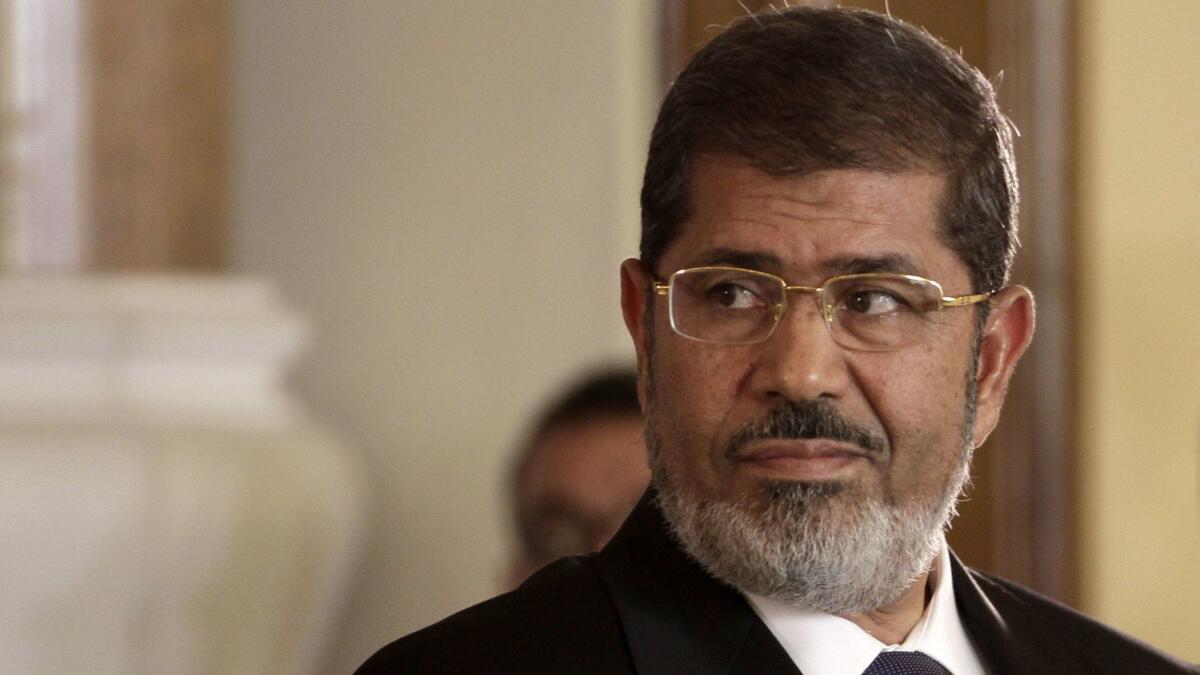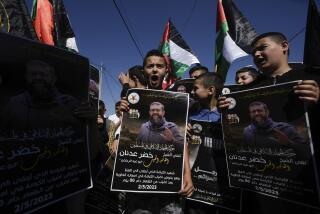Ousted Egyptian President Mohamed Morsi’s death renews criticism of his treatment in prison

Reporting from Cairo — Former Egyptian President Mohamed Morsi, imprisoned since the military removed him from office in 2013, died Monday after collapsing in court, officials said, putting the nation’s authoritarian-minded government on the defensive over his treatment in custody.
The country’s first democratically elected president and a leader of the now-outlawed Muslim Brotherhood movement, the 67-year-old California-educated Morsi lasted only a year in office before his defense minister, Abdel Fattah Sisi, moved to wrest power from him. Sisi has been president ever since.
Egyptian authorities did not immediately disclose the cause of death. The public prosecutor said in a statement that Morsi was taken to a hospital after his collapse, and pronounced dead there. It said there would be a forensic report, but did not say when that was expected.
Security jitters were immediately apparent after the death announcement. Egyptian media said the Interior Ministry had ordered a state of the highest alert.
But in Tahrir Square -- the epicenter of the Arab Spring protests that set in motion events that led to Morsi’s presidency – the mood was calm, with little obvious sign of extra police vigilance, although some street cafes were closed. On a nearby bridge over the Nile, Egyptian families were enjoying a night out, with vendors selling balloons and snacks.
Morsi’s death, which followed years of reports of his health deteriorating in prison, was a dramatic new inflection point in Egypt’s tumultuous journey from the massive Arab Spring protests of 2011 that toppled Hosni Mubarak, a dictator of decades’ standing, and the country’s subsequent slide into a new era of repression under Sisi.
State television said Morsi collapsed during a court session that was part of his trial on espionage charges, one of dozens of legal proceedings that punctuated his years of imprisonment on an array of charges. At one point he was sentenced to death.
In early courtroom appearances, he defiantly maintained that he was the country’s legitimate president. After he yelled angrily at judges, the authorities soundproofed the cage-like dock in which the accused are customarily held.
The government’s violent 2013 crackdown on the Muslim Brotherhood and its supporters, which left hundreds dead and virtually all the movement’s major leaders jailed or in exile, fractured Egyptian society.
Morsi was a deeply unpopular president, his rule marked by a clumsily authoritarian style of governance. But the Brotherhood, while Islamist in nature, was a mainstream movement that had been allowed relative freedom under Mubarak and was enmeshed in many major institutions.
All that changed with Morsi’s ouster. The Brotherhood was branded a terrorist group, and Sisi presided over a dismantling of many basic freedoms in the name of fighting terrorism. At the same time, more radical Islamist groups emerged, waging an armed battle against Egypt’s security forces.
The Brotherhood denounced Morsi’s treatment in prison, saying he had been deprived of needed healthcare and given only rare family visits. Its exiled leaders openly blamed Sisi’s government for his abrupt demise.
“It’s not a regular death,” said Mohamed Soudan, a Britain-based senior member of the Brotherhood’s political arm, the Freedom and Justice Party. “This is a murder, 100%.”
Perhaps reflecting sensitivities about the circumstances of Morsi’s death, the initial television announcement was not read out by a news anchor, but consisted only of an image of a brief written statement.
It said Morsi “died today in the courtroom after he asked to speak, and was allowed to speak.” It added that after the session was adjourned, he passed out and subsequently died.
Morsi’s death drew swift and inevitable attention to the country’s harsh jailhouse conditions and the plight of its many political prisoners.
Human Rights Watch said it had been in the process of preparing a report on Morsi’s ill treatment in prison, and Sarah Leah Whitson, the executive director for the group’s Middle East and North Africa division, tweeted that the former president dying in custody was “entirely predictable.”
Amy Hawthorne, research director at the Project on Middle East Democracy, said it wasn’t known if the death was preventable but added: “What is known is that Morsi suffered from chronic diabetes and was repeatedly denied medical treatment, and was detained in inhumane conditions.”
Amnesty International, in a statement, called for a full investigation.
The conditions of Morsi’s imprisonment were also the subject of repeated complaints from his family. His youngest son, Abdullah Morsi, gave an interview last year to the French news agency AFP saying his father was in solitary confinement and that medical conditions including high blood pressure and diabetes were going untreated.
Another son, Ahmed Mohamed Morsi, posted on Facebook about the death. “Dad, with God we meet,” he wrote.
Mohamed Morsi was born in 1951 in a sleepy village in Egypt’s Nile Delta. He came to the capital to study engineering at Cairo University, then moved to the United States for graduate school at USC. Before beginning his political career in 2000 with his election to Egypt’s parliament, he lived the life of an academic, with teaching stints at Cal State Northridge and later at an Egyptian university.
In Egypt’s landmark 2012 election, Morsi wasn’t the Brotherhood’s first choice to stand as a presidential candidate. But its first choice fell through, and Morsi ended up not only as candidate but a dark-horse winner. His government, however, was inept and heavy-handed, and by the summer of 2013, there were massive street protests against him.
The army stepped in to remove him in what Morsi denounced as a coup.
That designation was never accepted by the Obama administration, in part because it would have triggered automatic aid cuts for Egypt, an important regional strategic partner of the U.S. Human rights concerns voiced by Washington amid the sweeping crackdown on the Brotherhood became much more muted after President Trump took office in 2017.
Trump has twice welcomed Sisi in the Oval Office, most recently in April. In advance of the visit, a bipartisan congressional group sought to call attention to the Egyptian leader’s human rights record and efforts to change the constitution to allow him to stay in office until 2034.
Trump said at the time he did not know about the parliamentary move in Egypt to drastically extend Sisi’s tenure.
“I think he’s doing a great job,” he told reporters. “I don’t know about the effort, I can just tell you he is doing a great job ... great president.”
The death Monday highlighted still-simmering regional tensions over Morsi’s removal from office and the crackdown on the Brotherhood. Turkish President Recep Tayyip Erdogan, one of his staunchest supporters, likened the death to an execution.
“I ask God for mercy for Morsi, our brother, our martyr,” Erdogan told reporters in Istanbul. He called the 2013 government takeover a coup and accused the West of remaining silent on the jailing and execution of political prisoners.
Thousands of Egyptians who feared arrest for ties to the Muslim Brotherhood fled the country after 2013, settling in Turkey. The Ankara government for a time cut diplomatic relations with Cairo, saying the legitimate president was still Morsi.
In Turkey, some members of Morsi’s former Cabinet and Brotherhood-affiliated lawmakers set up a self-declared parliament in exile, and several television channels still broadcast from Istanbul, expressing support for the movement.
Special correspondent Islam reported from Cairo and Times staff writer King from Washington. Special correspondent Umar Farooq in Istanbul, Turkey, contributed to this report.
More to Read
Sign up for Essential California
The most important California stories and recommendations in your inbox every morning.
You may occasionally receive promotional content from the Los Angeles Times.










